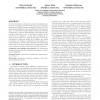Free Online Productivity Tools
i2Speak
i2Symbol
i2OCR
iTex2Img
iWeb2Print
iWeb2Shot
i2Type
iPdf2Split
iPdf2Merge
i2Bopomofo
i2Arabic
i2Style
i2Image
i2PDF
iLatex2Rtf
Sci2ools
SIGIR
2006
ACM
2006
ACM
Minimal test collections for retrieval evaluation
Accurate estimation of information retrieval evaluation metrics such as average precision require large sets of relevance judgments. Building sets large enough for evaluation of realworld implementations is at best inefficient, at worst infeasible. In this work we link evaluation with test collection construction to gain an understanding of the minimal judging effort that must be done to have high confidence in the outcome of an evaluation. A new way of looking at average precision leads to a natural algorithm for selecting documents to judge and allows us to estimate the degree of confidence by defining a distribution over possible document judgments. A study with annotators shows that this method can be used by a small group of researchers to rank a set of systems in under three hours with 95% confidence. Categories and Subject Descriptors: H.3 Information Storage and Retrieval; H.3.4 Systems and Software: Performance Evaluation General Terms: Algorithms, Measurement, Experimen...
Related Content
| Added | 14 Jun 2010 |
| Updated | 14 Jun 2010 |
| Type | Conference |
| Year | 2006 |
| Where | SIGIR |
| Authors | Ben Carterette, James Allan, Ramesh K. Sitaraman |
Comments (0)

